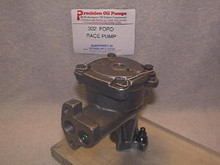Trying to ID a oil pump that's in a 302 engine. The cast-in numbers are:
221, VSA, M68, 67.
Is that enough info for an ID?
Thanks.
221, VSA, M68, 67.
Is that enough info for an ID?
Thanks.

This was an interesting tech article contributed by Melling.Either way use a standard pump . HV isn't needed in most any case

Melling provided a drive shaft with it.Run a hardened driveshaft on it....
You really believe that moving more oil, either through the engine or through the relief valve isn't adding significant resistance to the shaft?Melling provided a drive shaft with it.
It is pressure, not volume, that adds significant resistance to the pump turning. Both the HV and standard pumps are designed to provide the same maximum pressure via a bypass valve. Yes, I may be moving more oil (some going through the bypass valve) compared to a standard volume pump, but I can be sure that when the oil thins (hot, or older) and I decide to spin it to 6k+, I will have a little extra pump capacity to provide the volume necessary to maintain closer to design pressure. Also, as an engine wears and bearing clearances become greater, the extra volume helps keep that pressure loss at bay.
The only way a HV pump should break a shaft or distributor gear is if the pump bypass valve malfunctions (same could happen with a standard pump). Pumping the pan dry is only going to happen if the return holes in the block is clogged. (I have a clean engine an 7qt pan so...)
It does add proportionally to the additional volume. Given HV pumps flow between 10-30% more, is that really significant? I sure would hope there is more the 1.3 safety factor built in to both the shaft and the distributor gear. Melling is very clear, in writing, that a HV pump will NOT hurt the distributor gear.You really believe that moving more oil, either through the engine or through the relief valve isn't adding significant resistance to the shaft?
It does add proportionally to the additional volume. Given HV pumps flow between 10-30% more, is that really significant? I sure would hope there is more the 1.3 safety factor built in to both the shaft and the distributor gear. Melling is very clear, in writing, that a HV pump will NOT hurt the distributor gear.
Melling provides a shaft with the HV pump. I am good with that. As an engineer I trust their engineering. You certainly are welcome to your opinion and I am equally welcome to mine.And oddly enough I never mentioned the gear....are they as clear about the shaft?
I cant believe you seem to think my recommendation is so radical that you feel the need to dispute it. Its a 20$ piece of insurance.....
Odd that they don't think fords driveshaft is up to the 1.3 factor....Melling provides a shaft with the HV pump. I am good with that. As an engineer I trust their engineering. You certainly are welcome to your opinion and I am equally welcome to mine.
Melling provides shafts on all their new pumps so apparently they don't trust OEM shafts for standard pumps either.Odd that they don't think fords driveshaft is up to the 1.3 factor....
Like I said, even Melling engineers agree with me. There were no "myths" until you got here.Melling provides shafts on all their new pumps so apparently they don't trust OEM shafts for standard pumps either.
My point of even posting in this thread was to help dispel the myth that HV pumps are bad. The OP was concerned enough that he was going to replace it if it happened to be HV. That is illinformed. Is HV necessary? Probably not. Is it going to hurt anything (other than a little more horse power)? No.
The drive shaft is not included with the M-68 pump.Melling provides shafts on all their new pumps so apparently they don't trust OEM shafts for standard pumps either.
Really? Melling says you need to go spend $20 for cheap insurance when they provide a shaft with the pump? I missed where they confirmed that myth.Like I said, even Melling engineers agree with me. There were no "myths" until you got here.

